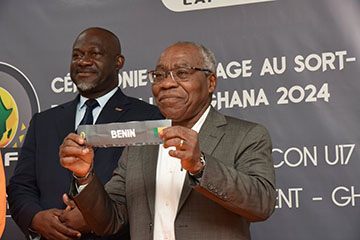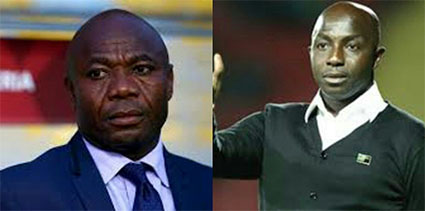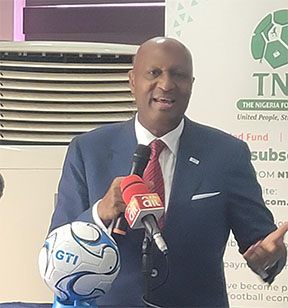Nigerian Football
AGEGE SET FOR ITS HIGHEST PROFILE EVENT IN HISTORY
BY KUNLE SOLAJA.
Agege Stadium makes history on Sunday when it hosts the maiden edition of the Nigeria’s national football cup now called AITEO Cup.
The national cup itself is in its in its 73rd edition having began in 1945 and held yearly except in 1973 owing to congested calendar.
The change of name of the competition this year is the fourth having earlier been known as Governor’s Cup from 1945 to 1954, All Nigeria Challenge Cup from 1955 to 1995, Coca-Cola FA Cup from 1996 to 2008 and Federation Cup from June 9, 2009.
Two former winners of the national cup will be contesting the AITEO Cup on Sunday.
Niger Tornadoes, winners via Akin Ademofe of Rangers’ own goal in the 2000 final match at the National Stadium, Lagos will be facing the 2015 winners, Akwa United.
The two sides therefore strive to win for the second time. But for Niger Tornadoes, it is the third time in the final having lost 1-4 to Stationery Stores in 1982.
On the road to this year’s final, Niger Tornadoes eliminated national cup holders, FC IfeanyiUbah on a 4-3 aggregate in the semi finals. Akwa United, seeking glory once again and a possible return to the CAF Champions League which it missed to Enyimba via fourth placing in the league, edged out fellow premier league sides, Lobi United and Shooting Stars before showing Sunshine Stars the exit rout last Sunday in the return leg of the semi final duel.
As for the Agege Stadium, it becomes the 13th arena to host the national cup final. Sports Village Square recalls that this is the first time the arena set up by the Western Regional Government of Chief Obafemi Awolowo as play ground for the industrial district of Ikeja as playground, will host a national cup final.
The national cup final which began as Governor’s Cup had its origin at Onikan Stadium which was then known as Association Ground. It hosted the national final under different names from 1945 to 1972 as it changed names from Association Ground to King George V and later to Lagos City Stadium.
It never hosted the final under its present name of Onikan Stadium, a name it adopted after the old structure was pulled down in 1974 and rebuilt by Lateef Jakande’s government in the early 1980s.
It last hosted the then Challenge Cup in 1972 in an ill-tempered match between Mighty Jets and the then Bendel Insurance. The match ended 2-2 and had to be replayed. It was the last time a national final match was held at the water-front arena.
For the first time, the final was moved to Ibadan at the then Liberty Stadium, now renamed Obafemi Awolowo Stadium. The 1974 final was played at the newly built National Stadium, Lagos where successive editions were held uninterrupted till the 1988 edition which held at the Lekan Salami Stadium, Ibadan.
The fifth stadium to host the final match was Tafawa Balewa Stadium, Bauchi in 1989. It was in Bauchi that history was made when for the first time in 36 years; a club from the North won the national Cup.
The relatively unknown and young Amodu Shaibu coached BCC Lions to beat a higher rated Iwuanyanwu Nationale 1-0.
The Bauchi stadium went on to host in 1994. Aper Aku Stadium, Makurdi was the sixth host in 1992. It hosted again in 2008.
Sports Village Square recalls that the Ahmadu Bello Stadium, Kaduna in 1993 became the seventh host. Since then, the arena that was inaugurated on August 2, 1964 hosted again in 1997 and 2003.
The eighth host was Ranchers Bees Stadium in Kaduna in 1998. Ogbemudia Stadium hosted in 2004 as the ninth arena while Liberation Stadium, now renamed Yakubu Gowon Stadium hosted the following year.
The MKO Abiola Stadium, Abeokuta became the 10th stadium to host the then FA Cup in 2006. For the first time, Teslim Balogun Stadium, Lagos hosted the final in 2007 a role it repeatedly played in 2009 and from 2011 to 2016.
The 12th stadium to host the final match was Sani Abacha Stadium, Kano in 2010.
Past National Cup Final Matches Venues
Association Ground, Lagos (Later Lagos City Stadium) 1945 to 1972)
Liberty Stadium, Ibadan (Now Obafemi Awolowo Stadium) 1972 replay.
National Stadium, Lagos. 1974 -1987, 1990, 1991, 1995, 1996, 1999-2002.
Lekan Salami Stadium, Ibadan. 1988.
Tafawa Balewa Stadium, Bauchi. 1989, 1994.
Aper Aku Stadium, Makurdi. 1992, 2008.
Ahmadu Bello Stadium, Kaduna. 1993, 1997, 2003.
Ranchers Bees Stadium, Kaduna. 1998.
Ogbemudia Stadium, Benin. 2004.
Liberation Stadium, Port Harcourt (now Yakubu Gowon Stadium). 2005.
Teslim Balogun Stadium, Lagos. 2007, 2009, 2011 – 2016.
Sani Abacha Stadium, Kano. 2010.
Agege Stadium, Lagos.
Nigerian Football
Nigeria face tough defence as Burkina Faso lie in wait at U17 WAFU B AFCON qualifiers

Defending champions Nigeria have been handed a difficult path to the 2025 U17 Africa Cup of Nations finals after being drawn in the same group as Burkina Faso for next month’s WAFU B qualifying tournament in Ghana.
The Golden Eaglets, who won the last edition of the regional championship in 2022, will also face Togo and Niger in Group B of the competition which runs from 15-28 May.
Hosts Ghana find themselves in Group A alongside Cote d’Ivoire and Benin in a tough-looking section of the competition to be played in Accra.
The draw was conducted by 1970s Ivorian football legends Kobenan Kouman and Die Foneye at the Ivorian FA headquarters in Abidjan on Friday.
Nigeria claimed their WAFU B U17 AFCON title by defeating Burkina Faso 2-1 in the regional final in Ghana two years ago.
However, they will need to overcome some familiar foes if they are to defend their crown and with the Burkina Faso finishing third at the last TotalEnergies U17 Africa Cup of Nations, some exciting matches are expected.
Arch-rivals Nigeria and Ghana are among the two favourites and could meet in the final in Accra on 28 May, should they top their respective groups and make it through the semi-finals.
Ghana also have pedigree at this level, having the World Cup in 1991 and 1995 as they bid to reach the U17 AFCON finals on home soil.
The top two teams from the WAFU B tournament will qualify for next year’s U17 Africa Cup of Nations.
Groups:
Group A: Ghana, Cote d’Ivoire, Benin
Group B: Burkina Faso, Nigeria, Togo, Niger.
Nigerian Football
Former Nigeria international, Onye recommends Amuneke-Siasia combo for Super Eagles

BY KUNLE SOLAJA.
Kingsley Onye, the left sided defender who was a member of the first Flying Eagles side to have a podium finish at the U-20 World Cup has suggested the employment of Emmanuel Amuneke as the coach of the Super Eagles.
He wants him to be assisted by Samson Siasia when the ban on the latter lapses in August. Alternatively, Onye pointed to Sylvanus Okpala as alternative to Siasia.
The Super Eagles are in dare need for a head coach as the clock ticks down to the Match day 4 and 5 of the 2026 World Cup qualifiers in which the team is trailing at the third position.
The two matches in early June are crucial for the Super Eagles to bounce back into reckoning as the team can not afford to drop any of the available six points in the duels with South Africa at home and away to Benin.
From this Monday, it is 41 days to the potentially challenging tie with South Africa, but the Nigerian national team has been without a coach since the expiration of the contract of Portugal’s Jose Peseiro shortly after the Africa Cup of Nations in Cote d’Ivoire.
Without mincing words, Onye remarked: “Emmanuel Amuneke is the right man for the job of the coach of Super Eagles. He has been there before.
“He tasted it and had been fantastic with the Nigeria youth team, the U-17 by assisting Manu Garba to win the U17 World Cup in 2013 and as head coach, led the Golden Eaglets to win the cup again in 2015.”
Onye who played for the Enugu Rangers in Nigeria before venturing to the UK but had his career scuppered by freak injury pointed out that the solution to Super Eagles’ technical deficiency is the appointment of an indigenous coach and that Amuneke is the man.
In buttressing his assertion, he declared: “As a senior team coach, Amuneke qualified a long standing absentee team, Tanzania for the 2019 Africa Cup of Nations.
“His record as a player is also very impressive. He played and won with the Super Eagles, the AFCON 1994. He played at the Olympic Games and was also the first Nigerian to score two goals at the World Cup.
“He has played at the African Games and also for top clubs in the continent as he was a member of the Egyptian giants, Zamalek. In Europe, he played for Sporting Clube de Portugal and then Barcelona before injury ended his playing career.”
Onye also looked at the personality of Amuneke in recommending him for the Super Eagles job.
His record as a player is also very impressive. He played and won with the Super Eagles, the AFCON 1994. He played at the Olympic Games and was also the first Nigerian to score two goals at the World Cup.
He has played at the African Games and also for top clubs in the continent as he was a member of the Egyptian giants, Zamalek. In Europe, he played for Sporting Clube de Portugal and then Barcelona before injury ended his playing career.
Nigerian Football
GTI enlarges coast…spreads from League fund-raising to Federation Cup

BY KUNLE SOLAJA.
Strategic partners of the Nigeria Football Federation, GTI Asset Management and Trust Ltd has expanded their scope of operations from fund sourcing for the Nigeria Premier League to adding the responsibility of getting the national cup competition back into its glamorous days.
The MD of the company, Abubakar Lawal at the unveiling a revamped Federation Cup which has been renamed President Federation Cup remarked that his company decided to take a bold step to support the national cup.
“I am the happiest man today, he said in the opening remark of the rebranding of the national cup through signing of Memorandum of Understanding with the Ministry of Sports and the NFF.
“Our company is also strategically involved in ensuring that the President Federation Cup is given necessary attention to thrive using The Nigeria Football Fund (TNFF) as our vehicle to actualise this dream.
“Therefore, it is our vision that the oldest domestic football event becomes one of the best organised football events in the world in no distant future.”
-

 Nigerian Football1 week ago
Nigerian Football1 week agoRemo Stars add fuel to the fire as title chase turns East – West battle
-

 UEFA Champions League1 week ago
UEFA Champions League1 week agoNigerians among Leverkusen’s African quintetin historic Bundesliga triumph
-

 Nigerian Football1 week ago
Nigerian Football1 week agoRangers tenaciously hold on at Nigeria League top position
-

 Nigerian Football1 week ago
Nigerian Football1 week agoHeartland back to their homeland as they host Shooting Stars
-

 OBITUARY1 week ago
OBITUARY1 week agoAnother Germany World Cup winner dies
-

 FEDERATION CUP6 days ago
FEDERATION CUP6 days agoBREAKING! Federation Cup acquires presidential nomenclature…7th name since inception
-

 CAF Confederation Cup20 hours ago
CAF Confederation Cup20 hours agoNigeria’s Samson Adamu signs Algeria’s USM match forfeiture
-

 CAF Confederation Cup5 days ago
CAF Confederation Cup5 days agoConfederation Cup runs into crisis as Moroccan players of RS Berkane are stranded at Algerian airport following seizure of jerseys and equipment




